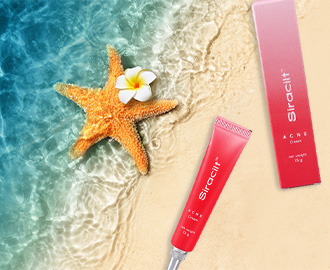How to tackle summer Acne and Breakouts
Summer is the season of sunshine, beach days, and vacations, but for many, it also brings an unwelcome guest—acne and breakouts. The combination of heat, humidity, sweat, and increased oil production can lead to clogged pores and inflamed skin. If you find yourself battling summer acne, don’t worry! With the right skincare routine and preventive measures, you can keep breakouts at bay and maintain healthy, glowing skin.
WHY DOES ACNE WORSEN IN SUMMER?
Increased Sweat and Oil Production – Heat and humidity cause excessive sweating and stimulate the sebaceous glands to produce more oil, leading to clogged pores.
Clogged Pores from Sunscreen and Makeup – Heavy sunscreens and makeup can mix with sweat and oil, blocking pores and triggering breakouts.
Bacteria Growth – The combination of heat, humidity, and sweat creates an ideal environment for acne-causing bacteria to thrive.
Frequent Touching of Face – Wiping sweat away or resting hands on the face can transfer dirt, bacteria, and oils, worsening acne.
Dehydration – Lack of adequate hydration can make the skin overcompensate by producing more oil, leading to acne.
EFFECTIVE WAYS TO PREVENT AND TREAT SUMMER ACNE
1. Keep Your Skin Clean and Refreshed
Washing your face twice a day with a gentle, oil-free cleanser helps remove sweat, oil, and dirt. Look for cleansers with ingredients like:
Salicylic Acid – Helps unclog pores and prevent breakouts.
Tea Tree Oil – Has antibacterial properties to fight acne.
Aloe Vera – Soothes irritated skin and reduces inflammation.
Avoid over washing, as this can strip your skin of natural oils, making it produce more oil to compensate, worsening acne.
2. Choose a Lightweight, Non-Comedogenic Sunscreen
Sunscreen is essential, but thick, greasy formulas can contribute to breakouts. Opt for a gel-based or mattifying sunscreen labelled “non-comedogenic” to protect your skin from UV damage without clogging pores. Look for:
Zinc Oxide or Titanium Dioxide – Provide broad-spectrum protection and have anti-inflammatory properties.
Oil-Free and Water-Based Formulas – Prevent excess oil build up.
3. Exfoliate to Remove Dead Skin Cells
Regular exfoliation (2-3 times a week) helps remove dead skin cells and prevent clogged pores. Use:
Chemical Exfoliants (AHAs/BHAs like glycolic or salicylic acid) – Help unclog pores and smooth skin texture.
Gentle Scrubs – Avoid harsh scrubs that can cause micro-tears and irritation.
4. Hydrate, Hydrate, Hydrate!
Dehydrated skin produces more oil, leading to breakouts. Drink plenty of water and use lightweight, oil-free moisturizers with ingredients like:
Palmitoylethanolmide (PEA): Helps sooth the skin. It has anti-itching, soothing effects on skin1.
Niacinamide (Vitamin B3): Vitamin B3, also known as nicotinamide & physiologically active form of niacin (nicotinic acid). It’s also a natural anti-inflammatory and moisturising properties.
Hyaluronic Acid – Retains moisture without greasiness.
Aloe Vera Gel – Soothes and hydrates sun-exposed skin.
5. Avoid Heavy Makeup and Opt for Breathable Products
Thick foundations and powders can clog pores in hot weather. Instead:
Use a tinted moisturizer or BB cream with SPF.
Choose mineral-based makeup that is light and non-comedogenic.
Always remove makeup before bed using a gentle cleanser or micellar water.
6. Wear Breathable Fabrics and Keep Your skin Dry
Tight-fitting clothes and synthetic fabrics can trap sweat and bacteria, leading to body acne. Choose cotton and moisture-wicking fabrics to stay cool and dry. Keep a clean face towel handy to dab away sweat instead of wiping with your hands.
7. Control Excess Oil with Blotting Papers
If your skin gets excessively oily throughout the day, use oil-absorbing blotting papers to remove excess shine without disturbing your makeup or skincare.
8. Avoid Touching Your Face and Clean Your Accessories
Your phone, sunglasses, pillowcases, and hats come in contact with your skin frequently. Clean these items regularly to prevent bacteria build up.
9. Treat Acne Spots with Targeted Treatments
If a breakout occurs, use targeted treatments. Siracilt Acne Cream is highly effective, reducing total acne lesions by 62% in 4 weeks*.
*Data on file.
10. Eat a Skin-Friendly Diet
Diet plays a role in skin health. Minimize foods high in sugar and dairy, as they can trigger acne. Instead, opt for:
Fresh fruits and vegetables rich in antioxidants.
Omega-3 fatty acids (found in walnuts, flaxseeds, and fish) to reduce inflammation.
Green tea for its anti-inflammatory and antibacterial properties.
When to See a Dermatologist?
If over-the-counter treatments and home remedies aren’t helping, or if acne is severe and painful, consult a dermatologist. They may recommend:
Prescription topical treatments (such as retinoids or antibiotics).
Oral medications (like isotretinoin for severe cases).
Professional treatments (chemical peels, laser therapy, or extractions).
Summer acne can be frustrating, but with a proper skincare routine, mindful habits, and the right products, you can keep your skin clear and healthy. Focus on cleansing, sun protection, hydration, and oil control while avoiding heavy products that may clog pores. If breakouts persist, don’t hesitate to seek professional advice. Enjoy the summer with fresh, glowing skin!
By following these tips, you can beat summer acne and enjoy clear, radiant skin all season long.
⦁ JEADV 2008, 22, 73–82

